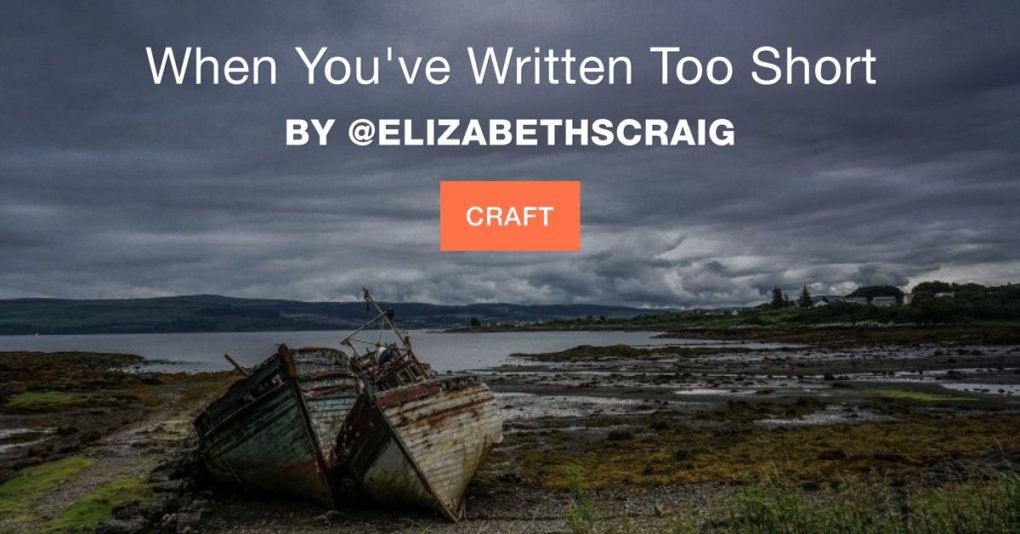by Elizabeth S. Craig, @elizabethscraig
I’ve written several books that were pretty short. I realized they were short (around 50-53,000 words) and took a closer look at the stories. I didn’t see a good way of adding anything to the books that would make them any better. They were just really lean books that still allowed for character development and a solid mystery. I left them as-is and published them.
I even wrote short for Penguin once or twice. They didn’t say a word about it, simply reduced the price of the paperbacks a dollar and let them stand as they were.
But occasionally I’ll write short and go, “Okay. This is too short.” And I’ll find ways of adding elements to the story that will genuinely make the story richer and have more depth. My most recent release is an example. It worked so well that I thought I’d share the couple of approaches I took to make it work.
Flesh out summarizing narrative. This was something that my editors at Penguin would frequently (rightly) bring up with me and really should be done regardless of whether you’ve written short or not. I’d have a sort of placeholder bit of narrative that basically just summarized what the character did for the rest of the day as some transition. But going back through in another draft, there’s always an opportunity there to add something meaningful. I realized that readers would likely be interested in what my sleuth’s life with her brand-new husband was like. How had life changed? What was difficult? What was better? It gave me the chance to sketch some of this in and develop my character a bit more, as well. This approach even provided some light conflict for the story.
Get into the character’s head. (More about this approach in my post, “Empathizing With Your Character”. Take a look at supporting characters: is there an opportunity for development there that can add something to the story or shed light on the protagonist? Is there a good subplot that could add conflict to the story and dimension to the main character?
Further reading:
5 Fun and Easy Ways to Lengthen Word Count by K.M. Weiland
What to Do When Your Novel’s Too Short by Janice Hardy
Do you ever write short? Do you find ways to lengthen the books or just release them as shorter books?
When You've Written Too Short: Share on XPhoto on VisualHunt

I write short! Usually it’s because I leave out most of the description – it’s all dialogue and action. Adding in the description usually makes it long enough. But the story I’ve working on now will need a little more, so thanks for the suggestions.
Glad you’re working on a story! I do the same thing…leave out descriptions in the first draft.
These are good ideas, Elizabeth. And this is a challenge I face, because my original writing background was academic writing. You don’t ‘flesh out’ there in the same way as you do with fiction. So I’ve had to teach myself to tell a larger story.
Which is very sparse! I think you’ve done an excellent job with your book lengths. :)
I suspect my current WIP will run short, probably due to transitions like “The next day…”
Thanks for the reminder to go back and flesh them out!
I have so many of those, too! Good luck with yours. :)
I write short. My writing is very spare. I give only the necessary description to set the stage for the reader. It’s resulted in some novella length mysteries and some novels in a long series (11 books and counting). Readers complained early in the series about the books that were shorter but now they just devour the next and the next. I think writing in series is the key if you’re going to write short.
As a reader I definitely prefer sparse description and I think that has translated over to my writing. It surely does result in some shorter books, though! Good point that writing in series is best for shorter projects.
My first drafts are usually too short. My descriptions are measly or missing. There are long spurts of dialogue with no way to tell who’s even talking. The transitions between scenes stink. Sometimes I just want to get the story out of my head and the writing goes faster without all that stuff. Thank goodness for edits. And for my editor – who pokes me in the butt when I don’t flesh something out well enough. Everything is fixable. My final drafts usually end up between 60K and 100K words depending on the genre.
I’m usually automatically good with my dialogue tags, but I’m a lot like you in that the descriptions aren’t there in the first draft (nor the chapter breaks). I was contracted to 75K words with Penguin. *Sometimes* I made that. :) The thing about cozies is they’re *perfect* as shorter reads.
Hi Elizabeth – sometimes shorter is better or at least just as good – but can see where you’re coming from. It’s probably easier to subtract, rather than add … and frankly I’d rather read a good read, than something that’s ‘boring’ because it’s too long … cheers Hilary
I’m a reader who skims all the boring parts, so I agree with you! Hope you have a great upcoming weekend!